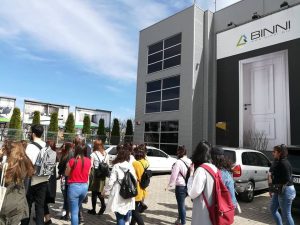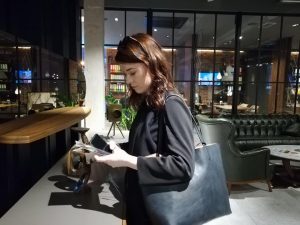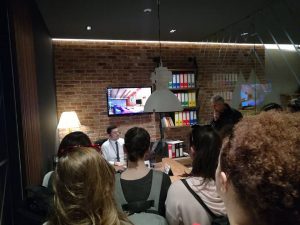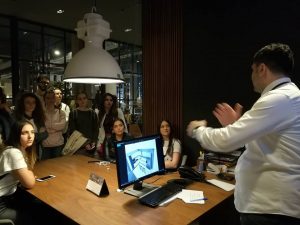- UBT Integrated Design Industry Partnership
Kosovo labour market and Labour Force Survey do not directly specify and quantify the demand for Integrated Design professionals. However, a closer analysis helps discern an emerging trend in Kosovo economy ; competitive advantage in the design and production of consumables, leather and footwear, furniture design and production and textiles. Based on a recent study of higher education graduate demand in economic and skill sectors (EC/LSE, 2015) in Western Balkans and Kosovo, the areas where potential graduates are expected to engage have shown dynamic growth trends. Kosovo based companies have been increasingly using their competitive advantage in cheap labour and proximity to European Union to create a thriving textile industry, design of appliances and consumables, design of furniture, design of jewellery and communication design through outsourcing.
The programme satisfies the training demand expressed by the consumer product and intermediary components industry, professional product design practices, distribution and sales and design of computer graphics. The graduate enters the professional system with operational skills and abilities to work in a team and to interpret and render operational project indications and translating them into the economic and modelling requisites to go into production. Students are expected to have the necessary skills to assist in the research and concept development phase with the ability to understand user requirements, social and consumer dynamics, formal language and corporate philosophy. The graduates are expected to work in various areas: industrial product design, technicians for the development of physical and virtual product models, computer aided design technicians, device and product research, concept development assistant, sales and distribution assistants, visual merchandising, design of textiles and product graphics assistant.
UBT on the other hand uses an indicator framework to assess demand for professionals and economic sectors. The indicator framework is composed of: (1) skill sectors employing most of professionals (to differentiate among all workers in the sector), (2) share of professionals’ distribution in all economic sectors (ISCO) and (3) job creation tendency in the past decade for the respective economic sector (NACE). According to Kosovo Labour Force Survey (2015), the economic sectors with the highest share of employment and job creation are trade, manufacturing and construction. Adjusting to changing demands is usually rooted in knowledge used for integrated design projects in a thriving local and international market.
Kosovo is uniquely positioned to exploit its competitive advantage in textile design, graphics design and consumables product design. The the competitive advantage build on cheap labour may position professionals and firms in the sector in terms of better income, employment and overall social welfare. Therefore, domestic knowledge growth and development are key to gain and retain competitiveness. Based on the job creation indicator, destination areas for potential graduates: construction (interior design), manufacturing (textiles and leather design) are some of the most dynamics job growth sectors.
The institution has a wide network of institutions and industry network to enable students work placement. The programme in itself has attracted both students and people already engaged in the labour market and the study choice seems to have been mainly oriented as skills upgrading process. The programme emphasizes the importance of practical work both in terms of the share of hours dedicated to practical laboratory experience and its focus on an industry-based thesis and application.
The programme includes a Capstone/Thesis component which aims to promote and generate industry-relevant research, knowledge and projects. The theory-practice section above outlines the laboratories that the institution has acquired to enable students a greater emphasis on the practical component. Furthermore, the institution has attracted industry practitioners to lecture at the institution as a means to reinforce students’ insights into the latest developments in the industry. A complete list of agreements with industry as well as student mobility options has been described in detail in the Student Employment and Career Section of this report.
- Integrated design faculty is it supported by Industrial Advisory Boards that provide a forum for interaction between faculty and leaders from business, industry and government. Department chairs schedule regular board meetings to keep themselves and their faculty informed of the latest trends in industry; to review and validate program goals and objectives; and to discuss recommendations for curriculum development. The Alumni Advisory Board includes graduates who continually contribute to the cause of the University.
- Our links and partnerships with business and industry not only enhance our students’ learning experience, but also make a vital contribution to their successful development.Regular industry liaison events include guest lectures, presentations and workshops, industry-focussed group projects, company-sponsored hackathons, and annual poster presentation events for final year undergraduates and for postgraduate students. These enable students to develop contacts with companies and to tap into potential partnership and employment opportunities.
- BINNI
- USAID
- DOKUFEST
- AUTOSTRADA BIENNALE
- SOLID
Study visit at Bini Furniture Company-2017



